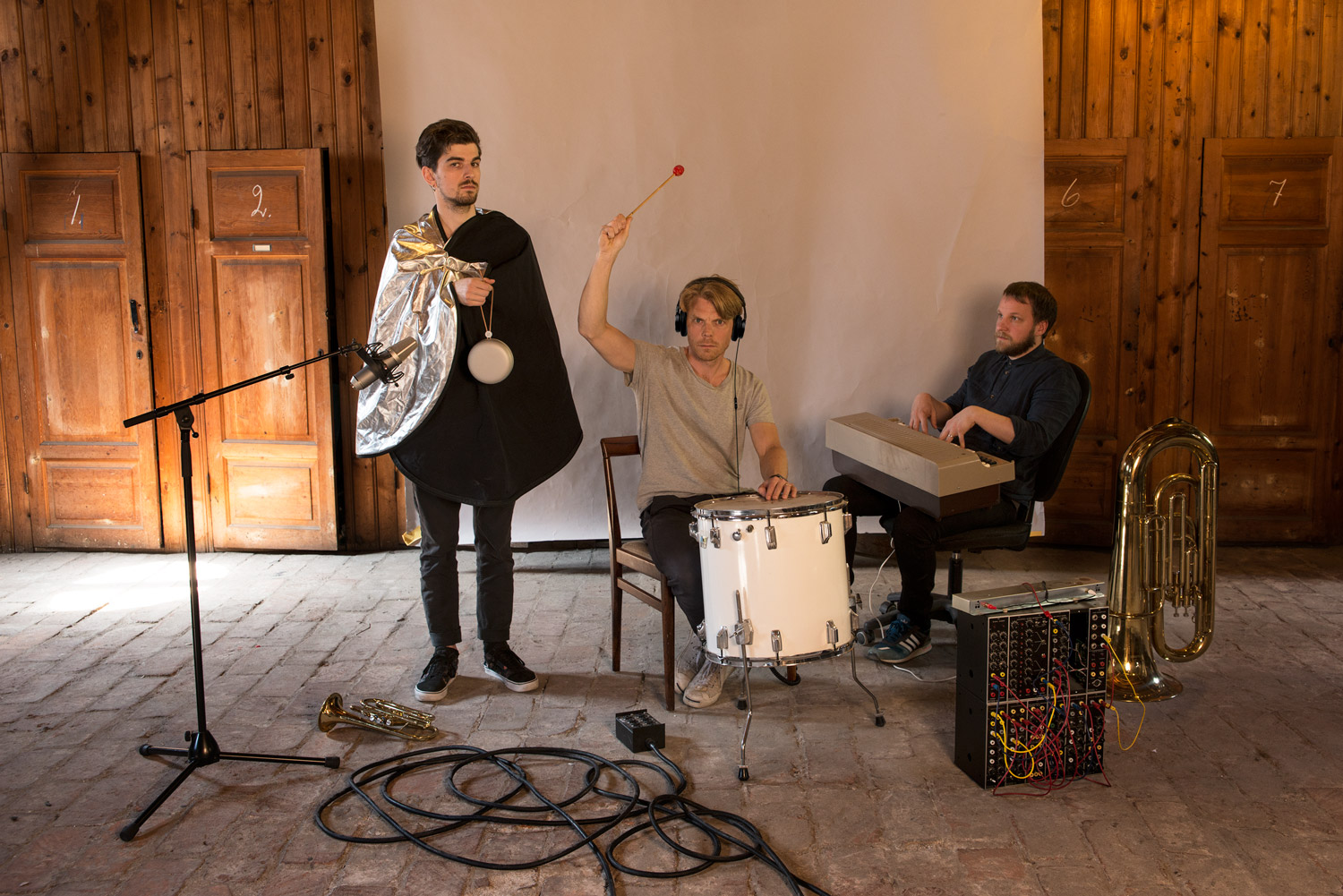So many people asked about the song we commissioned for our A1 portable Bluetooth speaker launch video that we had to hop on the next plane to Stockholm and chat with Plan8, the composers behind the track.
Another day at the office – Members of Plan8 warming up in their Stockholm studio, May 2016. From left: Bali Harko (Beoplay A1), Calle Stenqvist (H6) and Karl Johan Råsmark (keys)
Inside the track with Plan8
So many people asked about the song we commissioned for our A1 portable Bluetooth speaker launch video that we had to hop on the next plane to Stockholm and chat with Plan8, the composers behind the track.
| CONTRIBUTORS |
| PHOTOS: TOVA MOZARD |
Calle Stenqvist, Bali Harko and Karl Johan Råsmark are a busy, passionate trio of musical Swedes who work at Plan8, a dynamic studio of seven composers in Stockholm specialising in music and sound design. We met up with them at their production space – a former fire station – as the group prepared to travel to Los Angeles for a project.
May the tunes be with you: Bali and Calle hanging out under the watchful gaze of their friend.
Many of you are involved in different types of music making: chart pop and folk music and more. But how do a team of composers go about making a track together for a project like the A1 video soundtrack?
Calle Stenqvist: Usually, for a bespoke composition like the one in the A1 video, we get a brief from the client’s creative director. It’s often pretty abstract and describes the overall feel of the piece, especially how it’s meant to support the visuals. It’s my job to decode this, ask the right questions so that I can translate it into something meaningful in music terminology. Then we sit down as a team and talk about what we need to create. After that either Bali or Karl Johan takes over and starts fleshing out the track.
In the case of the track we made for the A1 video it was Bali who did the groundwork, and then Karl Johan and I came in later to add different pieces to the puzzle, like lyrics and vocals for the chorus.
Bali Harko: Yes, the collaborative nature of making music is really exciting, and it can be really frustrating when you’re stuck with your own ideas and can’t find a way out. Most of the time though we’re too busy to be several composers working on the same piece through all stages of the creative process. But we jump in and out of each other’s compositions a lot.
I'm interested in how the track for our A1 video came about: were you thinking about specific moods, activities or scenes when you made it? Also, does the song have a name?
Calle: With work like that it always starts with the brand and the story we are trying to tell in the film. To me, the A1 film is about the poetry found in everyday life. Little beautiful moments that make you feel alive. The song needed to feel warm and positive but have a stroke of melancholy and emotion to it.
Bali: Calle put together a video with some nice stills of people hanging out during the summertime, childhood memories and warmth to set the mood. So I wanted the song, and especially the vocals, to kind of hug and envelop the listener – for me, the vocal is like the little voice we all have in our heads – warning ourselves not to do something stupid, questioning, reminding ourselves of things – but here it’s telling us to try and see (and hear) the little details in every moment… how you’re allowed to lose yourself in the little things once in awhile and not overthink. The song itself is called “Out Of School” because I related it to the feeling of when you finish high school and look back with a mixture of nostalgia and melancholy, while still being positive and excited about what’s to come. It all came pretty naturally once I put myself in that mindset…
Karl Johan Råsmark: … exactly, Bali said it!
““I’ve always been interested in how all these sonic pieces come together to sound like one song””
How did you end up working together?
Calle: I hired them! Both Bali and Karl Johan came very well recommended by other music industry friends. Bali had just moved back to Sweden after some years in LA. Karl Johan didn’t really intend to go work for someone else, but I think the studio atmosphere and our team convinced him. Bali had just struck a hit with Rita Ora's "Body On Me" featuring Chris Brown – and Karl Johan wrote Danny Saucedo's "Dör För Dig" which won song of the year 2015 at the Swedish Grammy awards. So they were both pretty exciting to me!
Bali: ... I had actually been lurking around on their website a few times while living in LA, since a high school friend of mine was working there, and I thought his job seemed really sweet! When I moved back to Stockholm I got introduced to Calle and Plan8 co-runner Tor Castensson through a friend. They liked my music and got me involved.
Karl Johan: ... and for me it was – as it so often is – a matter of someone knowing someone, and just the right timing: my fiancee’s colleague’s husband’s friends knew Plan8 were looking to hire, and at this stage I had been working as an independent music producer for several years and was growing a little weary of always working on my own. The atmosphere and challenges at Plan8 were really intriguing and that’s it, really.
What are your creative backgrounds? Did you all come out of a conservatory or school, or are you self taught?
Bali: My dad is a musician and also a luthier, so it started with him giving me a violin that he had built for me when I turned six. Then he started teaching me how to play. I went to several music schools from age seven until I was twenty-two, studying jazz and contemporary guitar playing, and also music law. I started recording bands that my friends were playing in during high school, and that’s how I found music production. I took a few production classes when I lived in Los Angeles, but never anything extensive. It was just a natural step to go into it since I always played in bands, and have always been interested in how all these sonic pieces come together to sound like one song.
Karl Johan: My musical path took off as a result of early violin lessons, and singing and playing a lot in church while growing up. This gave me the musical foundation I needed to start exploring other instruments on my own. As teenager I was all about playing in various bands. My interest in music production started then as we recorded a lot of demos. Later, after I graduated from high school, I started studying at the Songwriters Academy in Örnsköldsvik, Sweden, and after that I moved straight to Stockholm to try and make it as a music producer. And that’s what I’ve been doing since.
Calle: I was brought up in a musical home where singing and playing instruments was part of everyday life. I went to several music schools and eventually started producing myself. I was always technically interested and started fiddling around with recording and DJ equipment. When I finished university I rented a studio space and started taking on music production jobs, recording bands and writing my own stuff. Soon it grew and we started Plan8.
Karl Johan ponders the sonorous possibilities of our Beoplay A1 speaker
““I’m not in any way recommending doing a 23 hour sitting, unless you know the result will be magic””
What’s the voice in the A1? Who is it singing in that robot-like vocoder voice – and what are they singing about?
Bali: It’s me! I recorded myself singing the lyrics kind of softly like a lullaby. I then vocoded it, doubled it and pitched it just to make it really hug the listener. It was important to make it feel comforting while being big and surrounding, and the vocoder did that in a nice way, I think. The intro is pretty basic, so the effect helped out a lot. The singing at the end is myself and Karl Johan doing the chorus in full voice.
But wait a minute... you haven't answered the full question: what exactly is the voice singing about?!
Bali: It's a secret. You'll have to listen very closely to figure it out...
Recording studios are very interesting spaces: creatively intense, focused on listening and imagining at the same time. Could you tell us a bit about your most poignant and creative times working in the studio?
Calle: I think Bali has lots of crazy stories from his time in LA studios, but this is Stockholm so the craziness level is pretty low. Most of the time we’re just hard at work. We try to establish a creative atmosphere in our studio by collecting together a lot of music instruments for inspiration. Every time someone in the team travels abroad he has to bring back a new instrument. So, for some reason, we have a pretty big collection of thumb pianos.
Bali: Late nights have a tendency to be really slow at first and then at some point turn around when everyone has overcome their tiredness and stopped caring so much. That’s when people start using their gut instead of analyzing every element in a song before it’s finished. I’m saying this because it's one of my biggest flaws. I did a session where I was sitting for 23 hours straight and couldn’t even say my name out loud out of tiredness. But listening to the end result the next day surprised me. I didn’t think about small edits and polishing everything to the bone while sitting there, and the result from that was something raw and real. Still, I’m not in any way recommending doing a 23 hour sitting, unless you know the result will be magic. It’s either that or when a song is finished in a matter of hours which yield the best results in my opinion.
Karl Johan: For me, having a creative job is about working hard, consistently and methodically so that when that moment comes, when you’re in a creative flow, you have enough knowledge to channel the inspiration into something concrete. And of course, once in a while that happens. I remember when we wrote the song that became the Swedish pop song of the year. That was a true strike of inspiration, almost like the song wrote itself. I’d say it took about 60 minutes and the song was done. It’s a pretty cool feeling when that happens.









